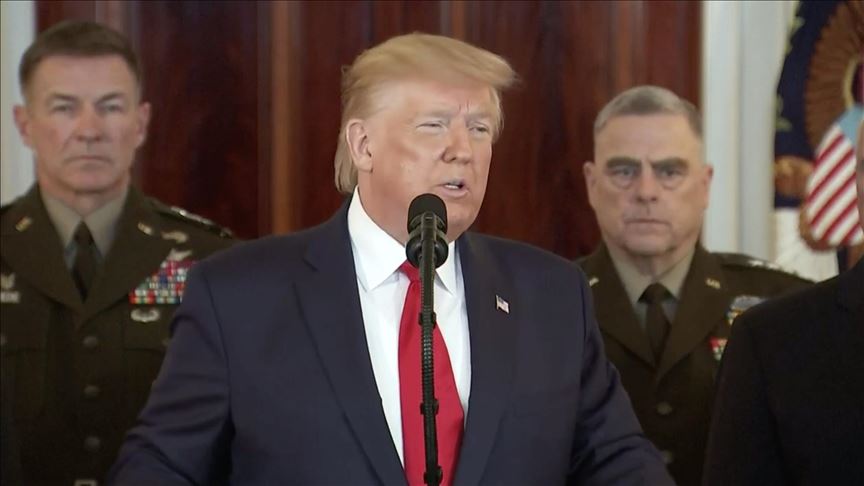US President Donald Trump says Iran "appears to be standing down" after it targeted air bases housing US forces in Iraq.
Mr Trump said no US or Iraqi lives were lost in the attacks, and the bases suffered only minimal damage.
The attacks on the Irbil and Al Asad bases came early on Wednesday morning local time.
Iran said it acted in retaliation after the assassination of top Iranian General Qasem Soleimani last week.
READ ALSO:Â Iran attack: US troops targeted with ballistic missiles
The US drone strike targeting him and Iran-backed militia figures in the Iraqi capital Baghdad was a major escalation amid already deteriorating relations between Iran and the US.
Iran's Supreme Leader Ali Khamenei described the missile attacks as a "slap in the face" for the US and called for an end to the American presence in the Middle East.
What did Mr Trump say?
The US president has previously threatened military action against Iran if it were to target US personnel and bases. But he stopped short of this, saying the attack had caused no casualties.
"No Americans were harmed in last night's attack by the Iranian regime," he said.
He also said that "American strength, both military and economic, is the best deterrent".
"The fact that we have this great military and equipment, however, does not mean we have to use it."
"Iran appears to be standing down, which is a good thing for all parties concerned," he added.
Mr Trump also said the US would immediately impose additional financial and economic sanctions on Iran, which would remain until it "changed its behaviour".
"Iran must abandon its nuclear ambitions and end its support for terrorism," he said.
What happened in the missile attacks?
More than a dozen missiles launched from Iran struck two air bases in Irbil and Al Asad, west of Baghdad, at about 02:00 local time on Wednesday (22:30 GMT on Tuesday).
Several other missiles landed at some distance from the targets.
The attacks came just hours after the burial of Soleimani, who controlled Iran's proxy forces across the Middle East.
It was the most direct assault by Iran on the US since the seizing of the US embassy in Tehran in 1979.
Just hours after the missile strikes a Ukrainian airliner crashed in Iran shortly after take-off. There is no evidence that the two incidents are linked.
Several airlines have announced they are avoiding both Iranian and Iraqi airspace amid the rising tension.
How did we get here?
The assassination of Soleimani - head of the Revolutionary Guards' elite Quds Force and architect of Iranian policy in the region - took place on 3 January.
The general was regarded as a terrorist by the US government, which says he was responsible for the deaths of hundreds of American troops and was plotting "imminent" attacks.
Iran vowed "severe revenge" for his death. Mr Trump, meanwhile, warned the US would respond in the event of retaliation "perhaps in a disproportionate manner".
Millions of Iranians turned out for the commander's funeral, with mourners chanting "death to America" and "death to Trump".
A stampede at the burial in Soleimani's hometown Kerman killed 50 people and injured 200 more on Tuesday.
Source: BBC





